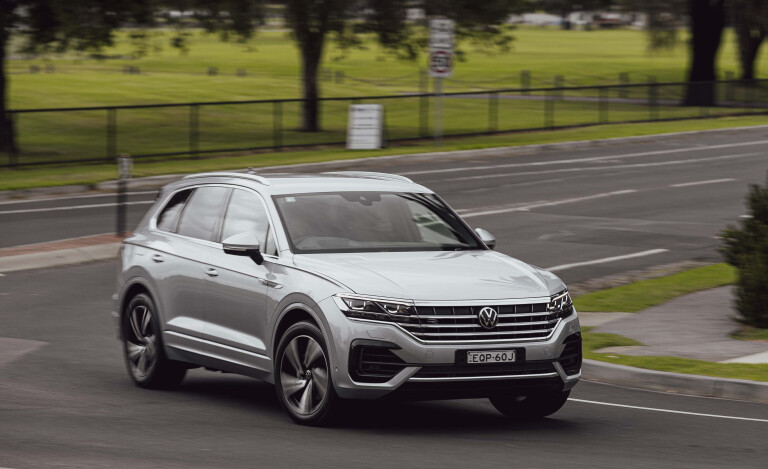
Score breakdown
Things we like
- Torquey powerplant
- Generous standard features
- Ample interior space
Not so much
- Delayed acceleration from idle
- Engine is a bit noisy
- 5-seater only
The 2022 Volkswagen Touareg 210TDI R-Line, for the time being, represents the top of the tree for Volkswagen’s flagship SUV. You can no longer buy the V8 TDI and you’ll have to wait until likely early 2023 for the rapid Touareg R to arrive.
Unless corner carving is a priority, however, the more rounded and relaxed 210TDI R-Line may offer a more compelling solution to the large SUV brief by offering a premium feel for a slightly less-than-premium price.
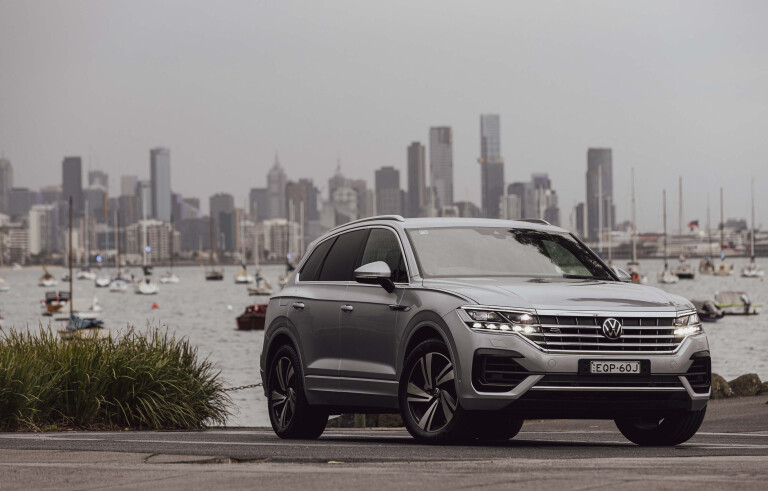
Pricing and features
Pricing begins at $112,690 (before on-road costs), which may sound like a lot for a VW to some buyers. There’s keen value to be found, however, when you consider the flagship Touareg’s positioning against more premium rivals such as the BMW X5, Audi Q7 or Mercedes-Benz GLE.
Its turbo-diesel 3.0-litre V6 produces 210kW at 4000rpm and 600Nm at 1750rpm, and is matched with an eight-speed automatic transmission spinning all four wheels via VW’s 4Motion all-wheel-drive system.
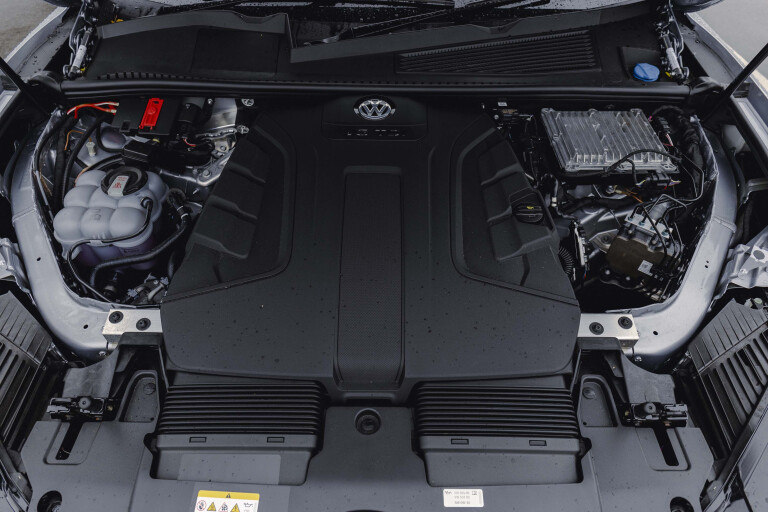
Rival entry-level offerings of a similar price, including the BMW X5 xDrive25D and Mercedes-Benz GLE 300d, have to make do with paltry four-cylinder engines, and the Touareg V6 outguns even its upmarket Audi Q7 TDI Quattro stablemate by 40kW/100Nm.
You’re also getting a much more generous equipment list, with the only options being a $5077 Sound & Comfort Package comprising four-zone climate control, surround-view camera system, Dynaudio Consequence premium sound system, heated outboard rear seats and automated parking with low-speed rear auto emergency braking. There is also an optional $2539 panoramic sunroof, if you must.
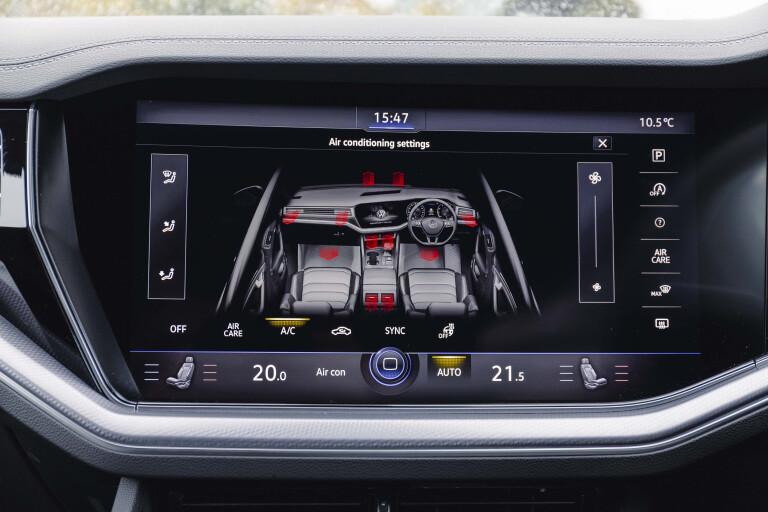
Pure White is the only standard colour, with a small selection of premium metallic and pearl hues asking up to an additional $1923.
Our Antimonial Silver Metallic ($1692) tester eschews the sunroof and Sound & Comfort package, so is left with the standard equipment set that includes air suspension with electronic damping, adaptive cruise control, eight-speaker stereo, 20-inch ‘Nevada’ style alloy wheels, ambient lighting, wired Apple CarPlay/Android Auto, Digital Cockpit Pro, DAB+ digital radio, electrically-operated tailgate, heated front seats with memory, heating and massage functions, IQ.Light Matrix LED headlights, keyless entry and start, and R-Line Savona leather upholstery.
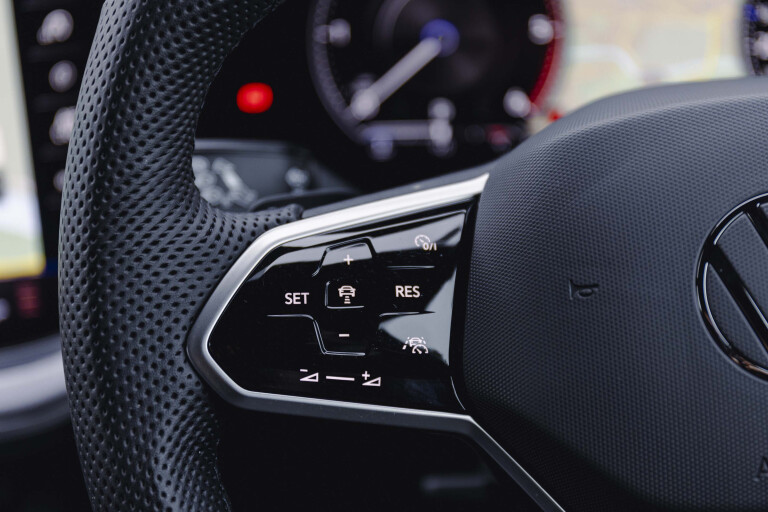
Standard-fit safety equipment includes front, side and curtain airbags for front and rear passengers, driver fatigue detection, autonomous emergency braking, parking bay and parallel park assist, lane-keep assist, blind-spot monitoring, reversing camera plus and rear cross-traffic alert.
Comfort and space
On first approach, the Touareg certainly looks like six figures worth of car given the sheer amount of real estate its footprint and stature commands. This generation of Touareg, available overseas since 2018, grows in length by 77mm, and in width by 44mm over its predecessor. The resultant effect is a cabin that feels tremendously airy and open. Combined with soft-touch materials and solid fit and finish, it’s a very nice place to be.
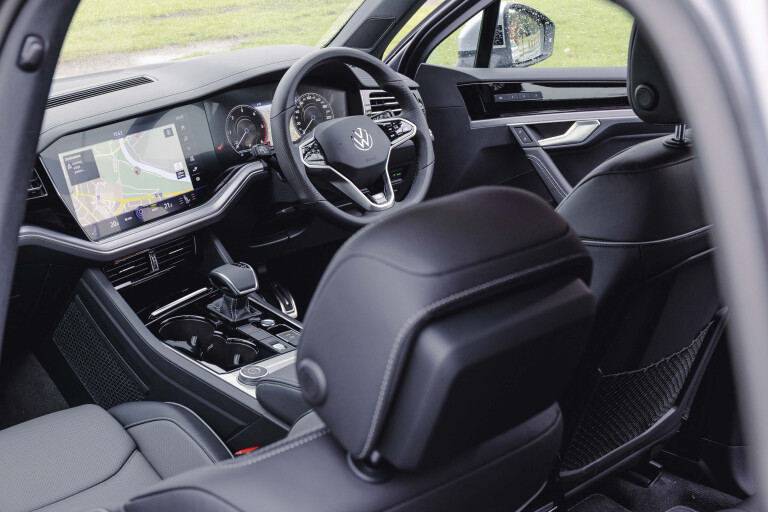
A Soul Black motif throughout the cabin presents smartly and is adorned with tech and convenience features. The massive 15.0-inch central infotainment screen is responsive and clear, and combines with the 12.3-inch digital instrument display to display a multitude of information and feature shortcuts. The interface itself is mostly intuitive, though the array of haptic controls on the steering wheel draws mixed reviews due to accidental inputs.
There is ample adjustability to be found in both the driver’s seat and steering column, catering for drivers of all statures. There is also a wireless phone charger, a large central bin under the armrest and deep pockets found in each door, all easily within arm’s reach. Oh, and there's an array of different massage functions available up front too!
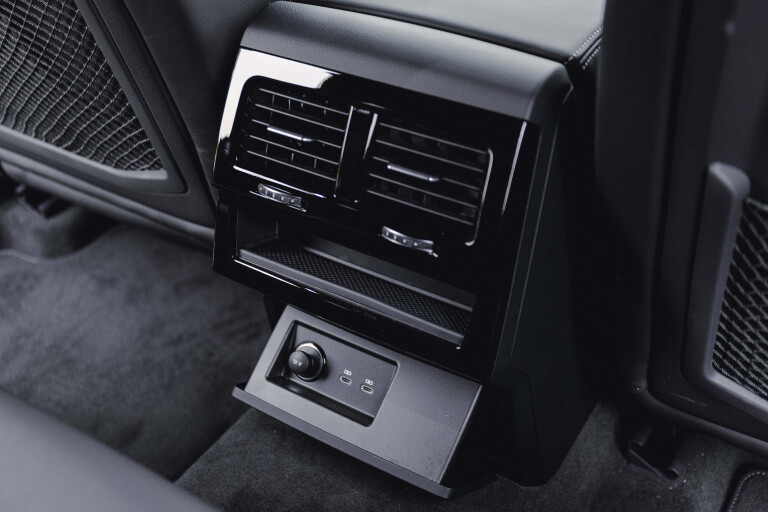
You wouldn’t be blamed for expecting to find a third row of seats stashed under the large boot’s floor, but all you’ll find there is a space-saver spare tyre and an ancillary battery used for the 210TDI R-Line’s standard-fit active stabiliser bars.
The Touareg is purely a five-seat affair and, while some buyers may be turned off by a lack of a third row, the Touareg prioritises intelligent packaging and comfort for its five special guests.
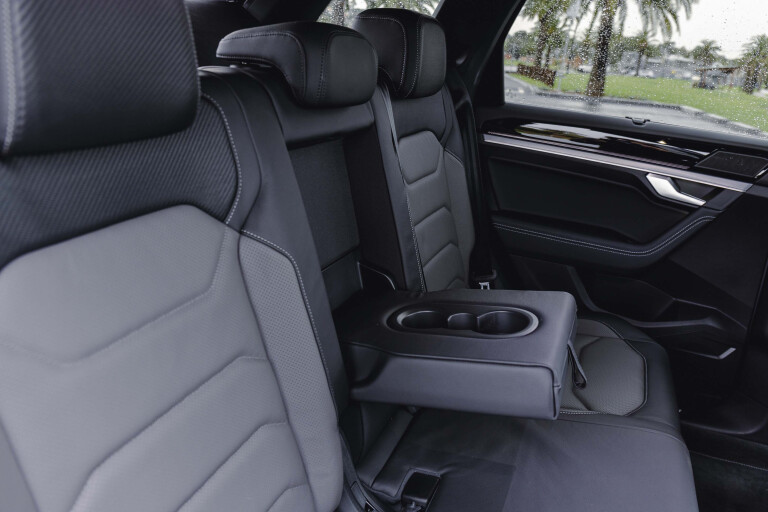
At 175cm, seated behind my own driving position, I’m greeted with ample knee, toe and headroom with impressive levels of adjustment found throughout the second row of seats. Back seats split 60:40 and can be adjusted fore and aft by 160mm, with three levels of adjustment for the backrest angle (up to 21 degrees of recline).
There are also four cup holders (one in each door, and two in the central armrest), rearward air vents, built-in sunshades and a dedicated 12V plug plus two USB-C ports.
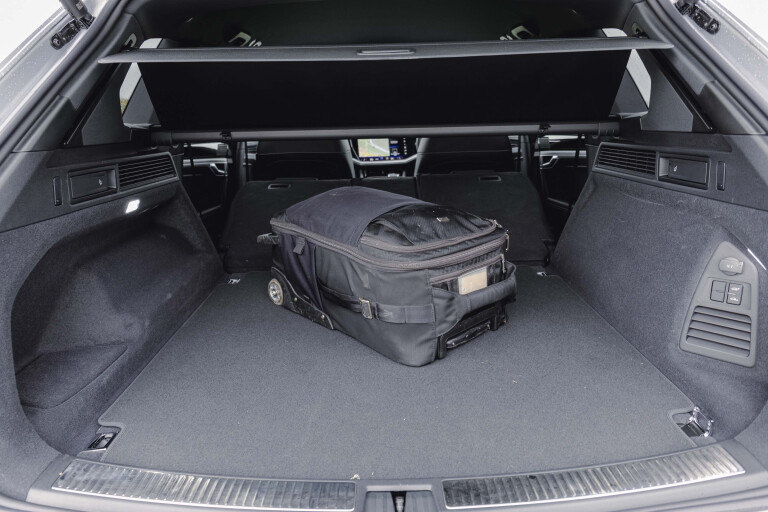
Further back, the boot caters for an impressive 810 litres of stowage space, which extends to a mammoth 1800 litres with the rear seats folded (easily done from the boot via pull-tabs on either side). You can even raise and lower the rear ride height via smart air suspension controls from the boot, to aid and ease loading or unloading heavy items.
On the road
Not only does the fully-loaded Touareg look and present like a six-figure car, it sure drives like one too.
Pertinently, the Touareg 210TDI’s standard air suspension delivers impressive and supple body control, especially for a large vehicle weighing more than 2.2 tonnes with a driver onboard.
Varying driving modes offer versatile bandwidth for a variety of scenarios yet, throughout the range, the Touareg remains a supremely comfy companion.
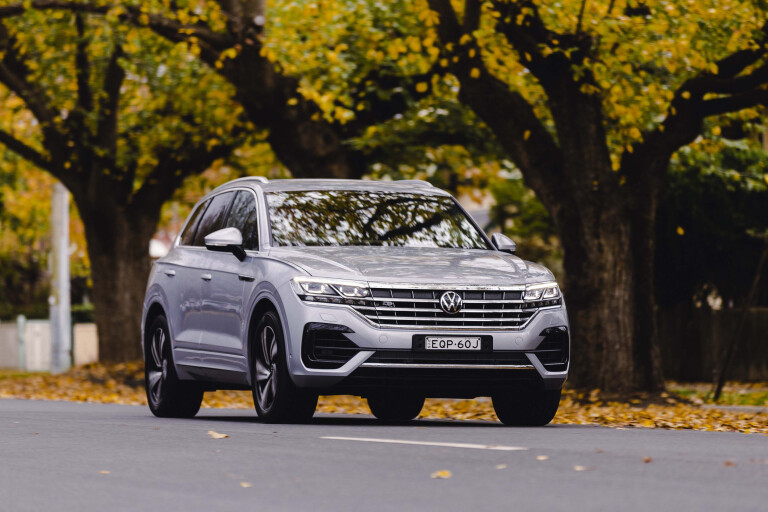
Comfort mode soaks up large imperfections with impressive composure, though can feel a little too soft when traversing large imperfections at low urban speeds, with secondary ride movements lingering a little longer before the car settles.
For these large imperfections, Dynamic mode delivers perfectly palatable composure and comfort around town, wrangling excess body movement just so.
In fact, Dynamic mode is more implied than explicit. The distinction between Dynamic and Comfort mode is very subtle, delivering an underlying firm edge to the Touareg’s inherent suppleness, but delivering no harsh crashing over large road imperfections. It also makes little meaningful difference to throttle response, which emerged as our main gripe with the otherwise lovable Touareg.
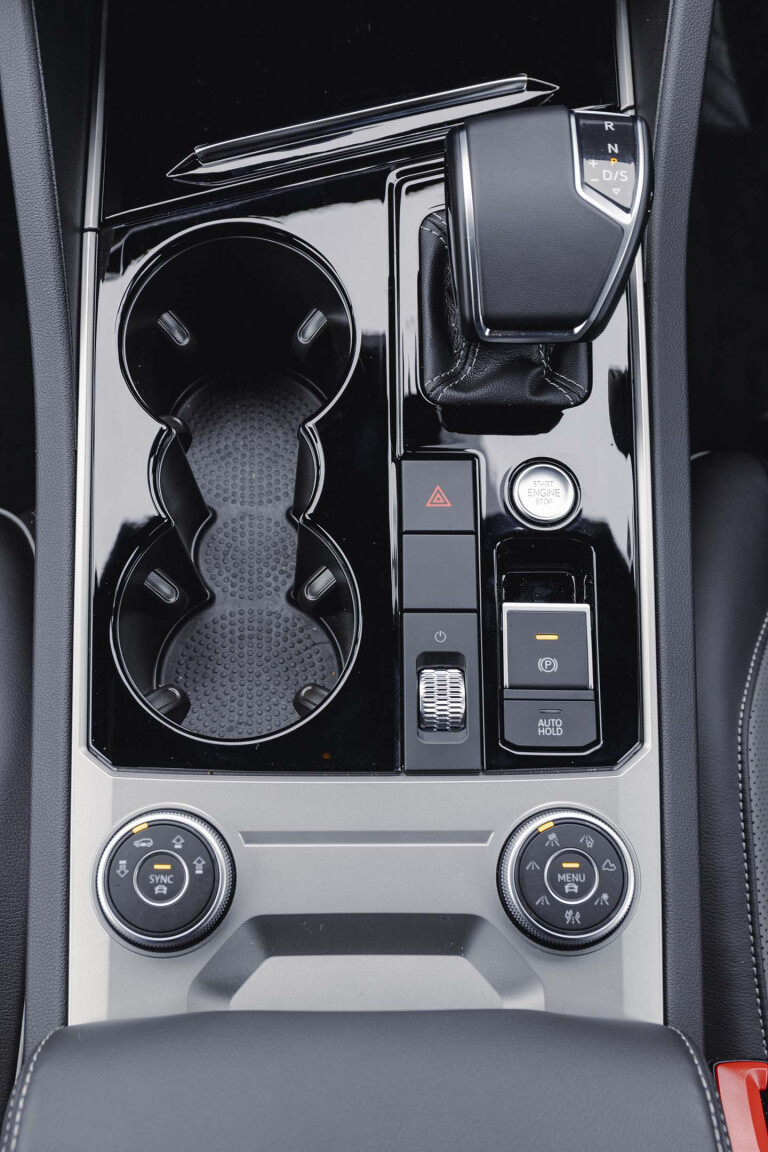
Response from a standstill frequently feels languid, with what feels like seconds passing between throttle input and kinetic response. This coalesces into a rather strange sensory feedback loop where you depress the throttle, hear the diesel mill spinning up with the typically clattery chat, before the clutches engage and progress begins moments later.
Despite 600Nm being quoted from 1750rpm, the diesel mill is slow to build revs and not much of anything happens before that point in the rev range. Once it gets on the boil, however, the Touareg pulls with strength, its transmission's smooth upchanges landing you right at the base of that large pile of torque.
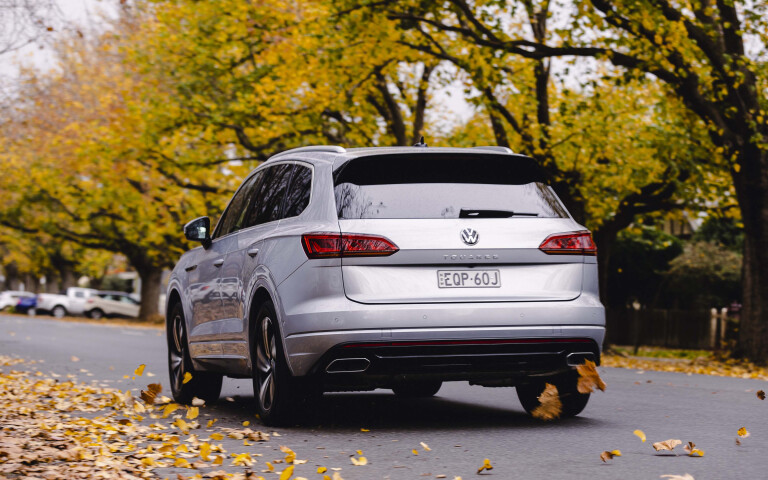
In-gear acceleration is similarly mighty, but there is also a noticeable delay to kickdown from a constant cruise. This can frequently result in an unintended display of speed as the eight-speed auto pauses for a moment while it plugs you into the meaty torque band, and the car responds by squatting sharply under acceleration.
Despite its R-Line positioning, the 210TDI won’t be the tool of choice for those chasing apexes and late-braking moments. Those buyers would do well to wait for the incoming Touareg R.
The 210TDI R-Line, however, knows what it is as a premium diesel five-seater SUV, and delivers on its brief as a plush long-distance hauler with acceptable amounts of dynamic poise.
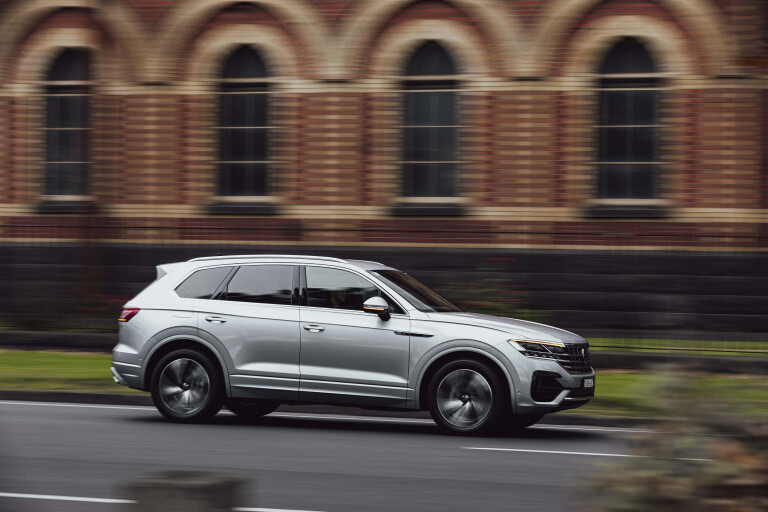
As the pace increases, despite its size, the Touareg feels smaller than it is. This is due to smartly harnessing some ingenious chassis technology that, rather than transforming the large SUV into a ten-tenths performer, elevates the premium Touareg across its versatile envelope.
The first piece that deserves mention is the standard four-wheel steering. Rear-steer drops the up-spec Touareg’s turning circle by a whole metre to just 11.19m.
In practice, I can attest to the Touareg performing manoeuvres in my underground apartment car park that even some more compact front-drive hatchbacks would simply fail to execute.
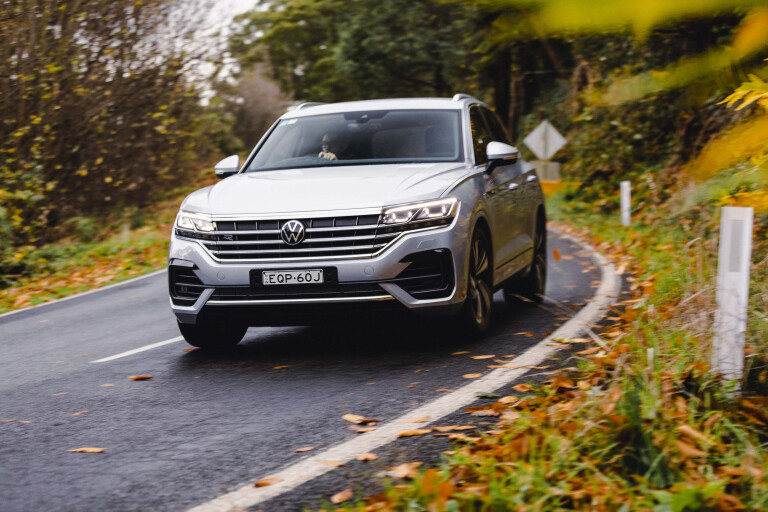
The second piece of crucial tech is VW’s Active Roll Stabilisation, which comprises two electromechanical anti-roll bars that can be independently stiffened or slackened to maximise roadholding.
Effects range from consistently flat cornering and body roll minimisation to the ability to decouple themselves entirely for maximum axle articulation in off-road scenarios.
It may not be nipping at the heels of any warm hatches on a mountain road, but it’s amicably entertaining to guide through some corners and you certainly won’t be penalised as a driver for taking to take the long way to the winery on the weekend.
The diesel-drinking 2022 Volkswagen Touareg boasts a 90-litre fuel tank and claims 6.8 litres per 100km on the combined ADR test cycle.
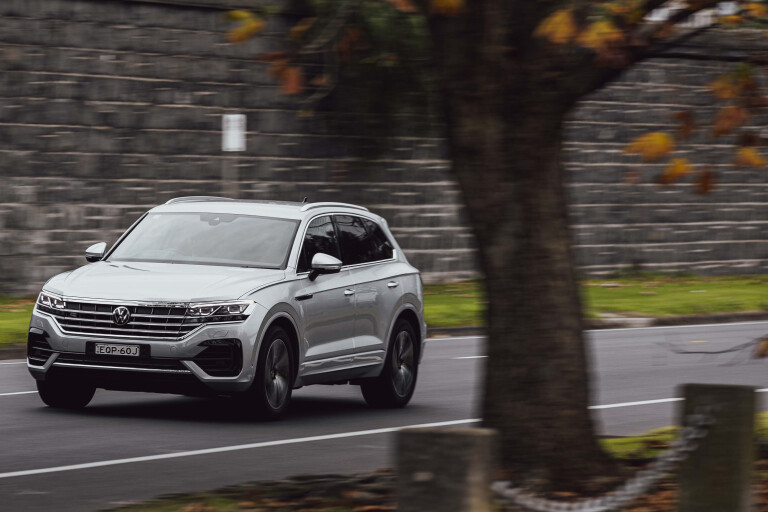
Ownership
All Volkswagens come with a five-year, unlimited-kilometre warranty as standard, with scheduled servicing required every 12 months or 15,000km.
Volkswagen also offers fixed three- and five-year capped servicing plans, respectively costing $1750 and $3000 for the Touareg 210 TDI R-Line.
Current-gen Touaregs are rated five stars by ANCAP based on a 2018-dated test conducted by Euro NCAP.
A note on towing is also worth a mention: the 2022 Touareg features a braked towing capacity of 3500kg, and an unbraked rating of 750kg. Despite its LandCruiser-matching towing capacities, the factory VW towball wears a lower download limit of 280kg, delivering a lower ultimate GVM of 2890kg, compared to a LandCruiser 300’s 3280kg GVM.
VERDICT
Despite representing Volkswagen’s most expensive single offering – until the Touareg R arrives, that is – the Touareg 210TDI trades high on its generous standard features, dynamic poise and torquey powerplant.
The dustings of R-Line elevate its urban athleticism in meaningful ways without introducing too much of a sharp edge. It’s big, it’s luxurious, and nails its brief as an endearing companion with smart and versatile packaging that benefits the whole family.
Can a six-figure premium SUV really be described as good value? That might be subjective, but when positioned next to its more prestigious rivals, the Touareg 210TDI R-Line certainly makes a strong case for itself.
2023 Volkswagen Touareg 210TDI R-Line specs
| Body | 5-door, 5-seat large SUV |
|---|---|
| Drive | all-wheel |
| Engine | 2967cc V4, DOHC, 32v, turbo |
| Bore/Stroke | 83.0 x 91.4mm |
| Compression | 15.5:1 |
| Power | 210kW @ 4000rpm |
| Torque | 600Nm @ 1750-3000rpm |
| Power/Weight | 97kW/tonne |
| Transmission | 8-speed automatic |
| Weight | 2169kg |
| Suspension (f) | MacPherson struts, multi-links, air springs, adaptive dampers, anti-roll (f) |
| Suspension (r) | multi-links, air springs, adaptive dampers, anti-roll (r) |
| L/W/H | 4878/1984/1686mm |
| Wheelbase | 2899mm |
| Tracks | 1660/1670 (f/r) |
| Steering | electrically assisted rack-and-pinion |
| Brakes | ventilated discs, 6-piston calipers (f); discs, 4-piston calipers (r) |
| Wheels | 20.0 x 9.0-inch (f); 20 x 9.0-inch (r) |
| Tyres | 285/45 R20 (f/r) Bridgestone Alenza 001 |
| Price | $112,690 + on-road costs |
Score breakdown
Things we like
- Torquey powerplant
- Generous standard features
- Ample interior space
Not so much
- Delayed acceleration from idle
- Engine is a bit noisy
- 5-seater only

COMMENTS